Dogtooth Blu-ray Movie
HomeDogtooth Blu-ray Movie 
Kynodontas / ΚυνόδονταςKino Lorber | 2009 | 94 min | Unrated | Mar 29, 2011
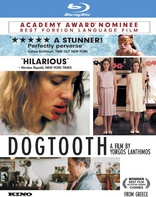
Movie rating
7.1 | / 10 |
Blu-ray rating
| Users | 2.8 | |
| Reviewer | 4.5 | |
| Overall | 3.3 |
Overview
Dogtooth (2009)
Three young people exist in a strange world of their parents' devising.
Starring: Christos Stergioglou, Michele Valley, Angeliki Papoulia, Mary Tsoni, Christos PassalisDirector: Yorgos Lanthimos
| Drama | Uncertain |
| Foreign | Uncertain |
| Dark humor | Uncertain |
Specifications
Video
Video codec: MPEG-4 AVC
Video resolution: 1080p
Aspect ratio: 2.35:1
Original aspect ratio: 2.39:1
Audio
Greek: DTS-HD Master Audio 5.1
Subtitles
English
Discs
50GB Blu-ray Disc
Single disc (1 BD)
Playback
Region free
Review
Rating summary
| Movie | 4.5 | |
| Video | 4.0 | |
| Audio | 4.0 | |
| Extras | 2.0 | |
| Overall | 4.5 |
Dogtooth Blu-ray Movie Review
A dark, surreal drama with bite.
Reviewed by Casey Broadwater March 31, 2011Dysfunctional families are a well-tread topic in the indie film industry—see: Julien Donkey-Boy, The Squid and the Whale, The Virgin Suicides, etc.—but I don’t think I’ve ever seen one as dysfunctional as the atomic unit portrayed in Greek director Yorgos Lanthimos’ Dogtooth, one of the bleakest, blackest satires to hit the festival circuit in years. In short, it’s about a father who keeps his three children—and, to a lesser extent, his wife—captive on their isolated family compound, outside the sphere of society’s corrupting influence. But that’s just the start. In a series of bizarre incidents, Dogtooth plumbs dark, provocative depths—incest, violence, animal cruelty—and finds a tonal netherworld that lies somewhere between the disturbing and the comic. At the 2009 Cannes festival, the film won the Prix Un Certain Regard, an award honoring daring young talent, and it was a dark horse contender—maybe underdog is the better word—for Best Foreign Language Film at the 83rd Academy Awards. The critical attention is not unwarranted. Dogtooth is a challenging, unsettling drama, and it announces Lanthimos as a filmmaker to watch.
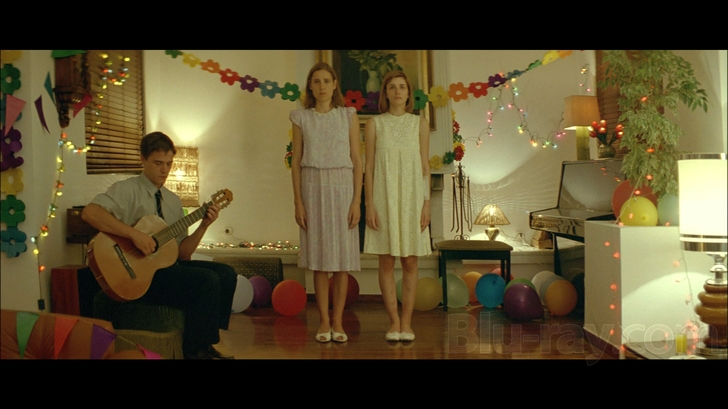
If Michael Haneke and Luis Buñuel had triplets who were photographed by Diane Arbus.
Lanthimos’ first shot sets up one of the film’s prevalent themes—the misuse of instruction to constrict the learner’s worldview. We see a cassette player sitting on a table and the voice from the tape announces the day’s vocabulary words: sea, motorway, excursion, carbine. But the definitions are all wrong. “The sea,” says the voice—which we later learn belongs to the family’s mother (Michelle Valley) —“is a leather armchair with wooden arms, like the one we have in our living room.” Motorway becomes “a very strong wind,” excursion is “a resistant material used to construct floors,” and carbine is linguistically transmogrified into “a beautiful white bird.” The children—all adults in their mid-to-late twenties—don’t know they’re being misled. Their entire universe is comprised of the family house, a large yard, and a swimming pool. An enormous fence encircles the property, and only the father (Christos Stergioglou) ever leaves, going to and from his job as manager of a large factory.
The kids—who don’t even have names, and are referred to as brother (Christos Passalis), younger daughter (Mary Tsoni), and elder daughter (Aggeliki Papoulia)—have been taught to believe that the outside world is a treacherous place, and that the only safe way to traverse it is by car. Father has promised them that when they lose their dogteeth—which, obviously, adults never lose—he’ll teach them how to drive. Their lives revolve around these kinds of fundamental deceptions. Airplanes are actually tiny models that fly across the sky. House cats are “the most dangerous animal there is.” A “pussy” is a “big light,” as in, “The pussy is switched off; the room plunges into darkness.” Their world is most definitely not our world, and yet, they know no difference. They have been raised to blindly believe and obey their parents’ every deranged utterance. When the father orders them to get on all fours and bark like dogs, they do it. When the mother punishes a minor offense by having her son fill his cheeks with mouthwash, he endures the stinging like a pro. Disobedience is not an option.
This is the kind of film where the plot is more intuitive than causal. Not much actually happens in the traditional narrative sense, but we’re led through a string of vignettes that takes us into the inverted emotional experience of what life is like for the three cloistered children. And they are children, despite being in their twenties. They throw tantrums, invent games—albeit, bizarre ones, like seeing who can wake up first after taking a massive whiff of an anesthetic—and get into petty, jealousy-motivated fights. The parents even reward their obedience with stickers. It’s arrested development taken to the extreme. But, of course, there are some developments that can’t be arrested, and I’m talking specifically about sexual urges.
The main thread of the story involves Christina (Anna Kalaitzidou), a factory security guard whom the father discretely hires to, shall we say, service his son. Their copulations are joyless and mechanical, the mere means to a biological end. Christina gets little pleasure out of this arrangement and begins to barter headbands, hair gel, and VHS tapes with the eldest daughter in exchange for oral sex. The daughter doesn’t understand the significance of what she’s doing—licking down there, for her, is no different than licking an elbow or an ear—and it seems like a more-than-fair trade for curious artifacts from the world beyond the family compound. Needless to say, when the father, wary of all outside influence, discovers the tapes—which include Rocky, Jaws, and Footloose—he reacts violently. I’ll reveal no more about what happens, as the plot is largely propelled by our compulsive desire to find out when and how this familial bubble will implode, but I will say this: taboos are broken, dogteeth are busted, and the film ends on a pitch-perfect note of lingering ambiguity.
It’s natural to look for a social subtext in Dogtooth—a metaphor to explain the madness—and there are a number of possibilities. Americans may see a polemic on the potential dangers of homeschooling and fundamentalism. Perhaps Europeans will tap into a political undercurrent. Lanthimos himself has claimed that the story arose when he began to think about the extremes the concept of “family” may have to go to in the future in order to remain useful or relevant. The film’s allusions and associations certainly leave its audience with plenty to consider—this is one mark of a great film—but in another sense, Dogtooth is best accepted at face value. It has the stark brutalism of a Michael Haneke film, but without the didactic finger wagging, the shock-factor of Lars von Trier’s best, minus the ego.
The film also achieves a rare balance between form and content. Besides being beautiful, Lanthimos’ compositions are precise and deliberate; at times his held-held camera wanders intimately through the events of the characters’ lives, and elsewhere it sits statically from a low height, much like Japanese master Yasujiro Ozu’s famed “tatami shots.” But where Ozu employed this down-to-earth camera positioning to put the audience at the eyeline of his seated characters, Lanthimos uses it to place emphasis on his characters’ bodies, often intentionally cutting off their heads with the top of the frame. This is a perfect aesthetic mirror for the story’s soulless, depersonalized sexuality. As a word of warning, some of the sex scenes are quite graphic—almost to the point of seeming unsimulated—but you’ll find no titillation here. In the isolationist world of Dogtooth, cut off from any and all cultural richness, sex becomes a lifeless, clinical act, as misdefined as the words on the children’s daily vocabulary exam.
Dogtooth Blu-ray Movie, Video Quality 
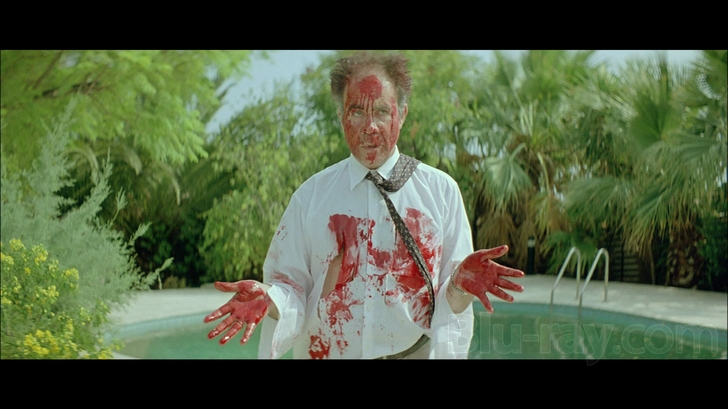
Dogtooth makes its U.S. Blu-ray debut, courtesy of Kino-Lorber, with a faithful 1080p/AVC-encoded transfer. Of course, the image is only as good as its source, so it's unfortunate that the print Kino used is periodically dotted with small black and white flecks, along with a few fleeting but noticeable scratches. This tends to make the 2009 film look much older than it actually is. However, Kino's "hands-off" approach to the transfer has its benefits; although the print debris hasn't been digitally cleaned up, there's no evidence of DNR—the 35mm grain structure is rich and healthy—and no apparent edge enhancement or other attempts at artificially boosting the picture quality. It is what it is, and for the most part, it looks beautiful! Thimios Bakatatakis' sun-lit cinematography is reminiscent of the flat, neutral, but slightly stylized look favored in a lot of contemporary photography, and as you'll notice, many of the screenshots included here could stand on their own as evocative works of art. The film's color palette is very controlled and muted, with occasional vivid contrasts, like the father's fake blood-stained hands against a backdrop of lush green trees. Black levels are suitably deep, and there are no overt color or brightness flickerings or fluctuations. Although clarity is not always tack sharp—remember, this is a largely hand-held film —the transfer brings out plenty of fine detail in the actors' faces and clothing. If you look hard enough, you may notice some slight compression noise mixed in with the grain, but it's hardly a distraction. Overall, I really enjoyed the look of the film.
Dogtooth Blu-ray Movie, Audio Quality 
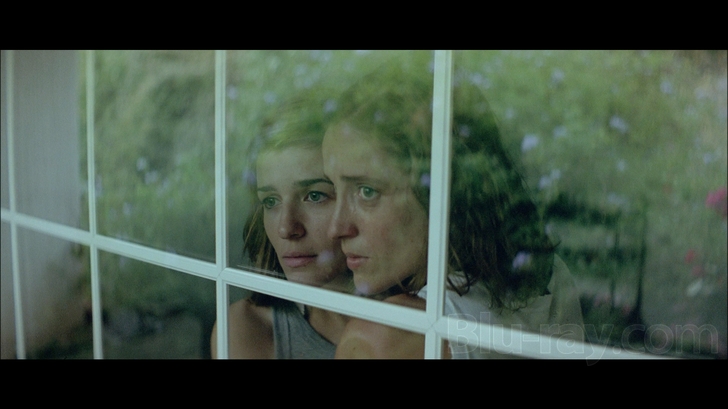
The film's DTS-HD Master Audio 5.1 surround track is spartan but effective, matching the minimalism of the imagery well. You'll notice quickly that there's no score dictating how you should feel about any given scene; only incidental music is used in the film, like the father playing a "Fly Me to the Moon" record for the kids, who believe Frank Sinatra is their grandfather. The mix, then, is dominated—although that's too strong a word—by dialogue, natural ambient sounds, and occasional effects. Voices come through cleanly, and the rear channels are put to good use; you'll frequently hear wind and overhead airplanes and numerous other outdoorsy noises. What's more impressive than the quality of the audio—which is all clear and relatively full sounding—is the way the track is edited. This is very much a film that makes you aware of its cinema-ness, as sound and image work with and against each other to obtain a desired emotional effect.
Dogtooth Blu-ray Movie, Special Features and Extras 
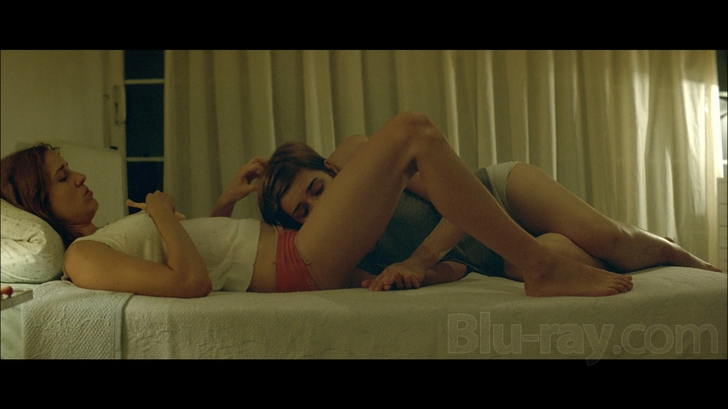
- Interview with Director Yorgos Lanthimos (1080p, 12:58): In lieu of an audio commentary, director Yorgos Lanthimos—who speaks excellent English—sits down for a candid interview about the film's themes and production, from the story's sci-fi origins as an exploration of the future of family, to the process of working with the actors to make them appropriately childlike.
- Deleted Scenes (1080i, 5:26): Includes three short, appropriately cut deleted scene, the best of which features the whole family singing "Fly Me to the Moon."
- Trailers (1080p): Theatrical trailers for Dogtooth (1:25), Army of Crime (1:50), Mademoiselle Chambon (1:50), and Home (1:43).
- Stills: A user-directed gallery with sixteen high-definition images.
Dogtooth Blu-ray Movie, Overall Score and Recommendation 
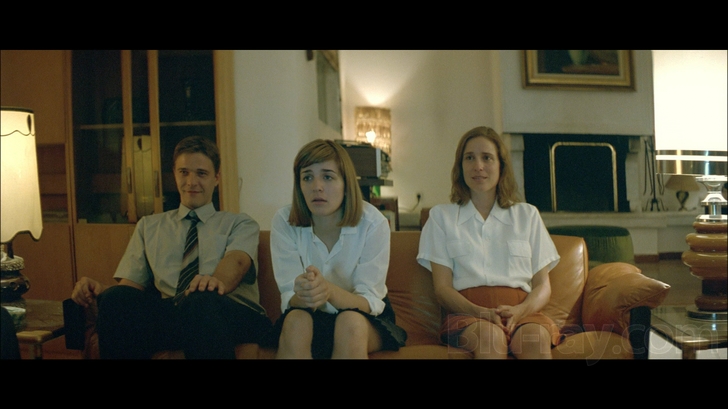
The Academy Award-nominated Dogtooth is an off-kilter family portrait, a study of sex divorced from society, and easily one of the best films of the year. It's definitely not for all tastes—I'm just waiting for someone to make an "it's all Greek to me" joke—but it's a must-see for those drawn to dark, complex cinema. Highly recommended!
Other editions
Dogtooth: Other Editions

Dogtooth
Kynodontas / Κυνόδοντας
2009

Dogtooth 4K
Kynodontas / Κυνόδοντας
2009

Dogtooth
4K Restoration | Kynodontas / Κυνόδοντας
2009
Similar titles
Similar titles you might also like

Port of Call
Hamnstad
1948

La Dolce Vita
1960

Beau Travail
1999

The Great Beauty
La grande bellezza
2013

The Club
El Club
2015

Simon of the Desert
Simón en el desierto
1965

The Celebration
Festen
1998

Holy Motors
Collector's Edition
2012

Another Round
Druk
2020

Force Majeure
Turist
2014

Parasite
기생충 / Gisaengchung / Theatrical and B&W versions
2019

Burning
버닝 / Beoning
2018

Tommaso
2019

Zama
2017

Saraband
2003

Aquarius
2016

Little Miss Sunshine
2006

The Love of a Woman
L'amour d'une femme
1953

Rust and Bone
De rouille et d'os
2012

Leviathan
Левиафан / Leviafan
2014